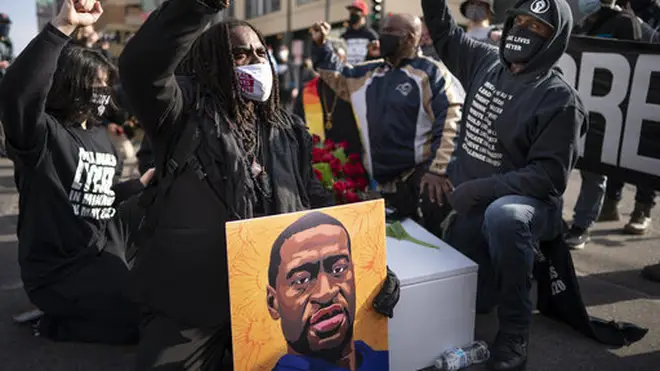
Clive Bull 1am - 4am
11 March 2021, 20:26

A third-degree murder charge has been reinstated against the former Minneapolis police officer charged in George Floyd's death.
Hennepin County judge Peter Cahill added the charge after the former officer, Derek Chauvin, failed to get appellate courts to block it.
Cahill had earlier rejected the charge as not warranted by the circumstances of Floyd's death, but an appellate court ruling in an unrelated case established new grounds for it.
Chauvin already faced second-degree murder and manslaughter charges. He has pleaded not guilty to all charges.
His trial jury is currently being selected but jury selection was delayed while Cahill considered reviving the third-degree murder charge.

Jury selection paused in trial over George Floyd death
According to Minnesota state law, the maximum penalty for third-degree murder is 25 years.
Legal experts say the additional charge helps prosecutors by giving jurors one more option to convict Chauvin.
Third-degree murder charges are not common and are only used by three states - Minnesota, Pennsylvania and Florida.
Murder charges tend to be split between first-degree and second-degree murder.
These both require proof that there was intent behind a killing, while a third-degree murder requires that prosecutors prove that Chauvin showed a reckless disregard for human life, but not prove that an assault led to the death.
READ MORE: Police officer charged with George Floyd's death freed from jail
READ MORE: Pair arrested after two men urinate on George Floyd mural in Manchester
A widely seen bystander video of Floyd's arrest last May recorded his repeated pleas that he could not breathe while Chauvin pressed his knee into his neck.
Floyd was declared dead on May 25 after Chauvin pressed his knee against his neck for about nine minutes.
Floyd's death sparked protests in Minneapolis and beyond, contributing to the Black Lives Matter movement globally.

Emotional caller from George Floyd's area: "I'm surprised this didn't happen sooner"
"You don't want jurors who are completely blank slates, because that would mean they're not in tune at all with the world," Susan Gaertner, a former prosecutor, said.
"But what you want is jurors who can set aside opinions that have formed prior to walking into the courtroom and give both sides a fair hearing."
The earliest that opening statements will begin is March 29.